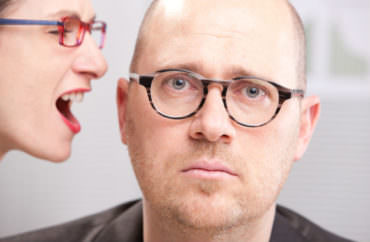
Using Title IX to ‘punish other people for expressing views they don’t like’
A male professor who underwent a yearlong Title IX investigation claims that “professional disagreements” with female colleagues have been redefined as sexual harassment.
But J. Martin Rochester doesn’t blame the University of Missouri-St. Louis’s Title IX staffers. In a post for the Martin Center for Academic Renewal, the international relations professor said they were “merely creatures of the system that the Obama Administration created.”
Rochester told The College Fix he’s still teaching at UMSL and “publishing scholarship,” though he never did learn the exact allegations against him or receive a final report that formally cleared his name.
He said in an email this incident won’t affect his classroom and digital demeanor: “I have always conducted myself in a professional manner inside and outside the classroom, and will continue to do so.”
MORE: Endless Title IX complaints against prof who warned about ‘sexual paranoia’
Rochester is far from the first professor to face a Title IX investigation that allegedly stems from professional activities.
Laura Kipnis, a film studies professor at Northwestern University, has faced multiple inquiries over the past two years in response to her writing on “sexual paranoia” on campus, most recently this summer.
Rochester’s situation “seems similar” to hers, Kipnis told The Fix in an email, in that “people [are] employing the Title IX process to punish other people for expressing views they don’t like.”
Called him ‘a serial sexual harasser’ to win an argument?
Rochester blames the Department of Education’s Office for Civil Rights for his investigation, citing its 2011 “Dear Colleague Letter” that reinterpreted Title IX.
That letter said sexual harassment can include “verbal” comments that are “unwelcome.” The University of California-Riverside, for example, says it may investigate community members for telling “offensive jokes.”
Rochester believes it was taken even further in his case, to encompass “heated exchanges that are not uncommon in the professoriate” if they take place between men and women.
MORE: Feminist law profs warn Title IX has been mangled beyond recognition
Political scientist J. Martin Rochester argues the laws of war are outdated in his new book. https://t.co/HEzu91wcEJ pic.twitter.com/yxYcL8yrdz
— University of Missouri–St. Louis (@umsl) May 13, 2016
“The letter was mainly aimed at incidents involving student-on-student sexual assault, but its sweepingly vague language invited constraints on speech itself,” Rochester wrote in his Martin Center post.
Because “basic due process elements” aren’t required under Obama administration guidance – informing a target of the allegations behind a charge and the identify of the accuser – Rochester can only guess the investigation stemmed from his criticism of a female colleague for “her persistent use of email to criticize our [political science] department chairperson.”
Another female colleague then attacked Rochester “out of the blue as a serial sexual harasser,” he wrote.
‘The male colleague’s decibel level is interpreted as excessive’
A single meeting with Title IX staff a year ago remained the extent of his interaction in the case, even though the charge hung over him the entire 2016-2017 academic year, according to Rochester.
In preparation for his case, Rochester “compiled endless paper trails” and many “documents as evidence.” He also sent a list of a “dozen names of prominent first-hand witnesses,” but investigators interviewed “few of these people,” he claimed.
However, he still received no communication from the Title IX staff until the first day of this semester, when the Title IX coordinator apologized in an email for not telling him the case had been “closed” months earlier.
MORE: Criticizing ‘The Hunting Ground’ violates Title IX?
It’s not the fault of UMSL’s Title IX office for his shadowy investigation, but rather the Obama administration, which has threatened free speech, fair legal proceedings and “just plain common sense” in academia, according to Rochester.
“I was left with an unanswered question: is it possible any longer in the current climate for one professor to have words with another professor of the opposite sex without it constituting ‘sexual harassment’ or at least triggering a sexual harassment investigation?”
He said the “critical variable” was whether “the male colleague’s decibel level is interpreted as excessive” to the female colleague.
Only one investigation (he knows of)
The Fix requested comment on Rochester’s allegations several times from the UMSL administration, with phone calls going unanswered or transferred to the wrong department.
At one point a “senior information specialist” told The Fix that Communications Director Bob Samples, who had not responded to calls, was back at his desk, but Samples did not answer then, either.
Shortly after this, Samples told The Fix via email that the university “does not comment on identifiable personnel issues.”
Though he faced uncertainty for an entire academic year, Rochester was only subject to a single investigation.
Kipnis, the Northwestern University professor, was subjected to a two-month Title IX investigation in 2015 for writing an essay in The Chronicle of Higher Education, “Sexual Paranoia Strikes Academia,” that questioned regulations governing student-faculty sexual relationships.
In a recent New Yorker article, Kipnis disclosed she had been subject to at least two more Title IX investigations after that, including one filed by several professors and students in response to her related 2017 book, “Unwanted Advances.”
MORE: Prof broke the law by writing book on ‘sexual paranoia,’ students claim
IMAGE: Giulio Fornasar/Shutterstock





Please join the conversation about our stories on Facebook, Twitter, Instagram, Reddit, MeWe, Rumble, Gab, Minds and Gettr.